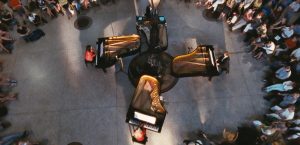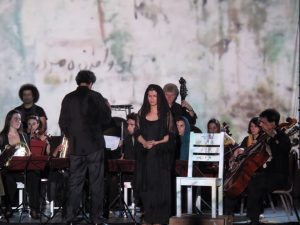Toeval? De twee Nederlandse documentaires in de hoofdcompetitie van het documentairefestival IDFA onderzoeken allebei wat muziek voor mensen kan betekenen. Twee films die elkaar bovendien op perfecte wijze aanvullen – de een gaat uit van het perspectief van de luisteraar, de ander van de musicus. Ramon Gieling schetst in About Canto de ingrijpende invloed die Simeon ten Holts Canto Ostinato op het leven van een aantal mensen heeft gehad. Frank Scheffer volgde de Iraanse componist en dirigent Nader Mashayekhi bij zijn poging Mahler in Teheran te introduceren. Beide films beleefden zaterdag hun première.

Gieling past in About Canto ongeveer dezelfde werkwijze toe die hij ook gebruikte voor Johan Cruijff en un momento dado (2004), waarin Spanjaarden hun liefde voor de Nederlandse voetballer bezingen, en Joaquin Sabina (2008), waarin de Spaanse zanger geëerd wordt door vrienden en fans. Ook About Canto is zo’n groepsportret. Een uitvoering van het beroemde stuk voor vier piano’s in het station van Groningen fungeert losjes als raamwerk, waarbinnen mensen van zeer verschillende pluimage vertellen over de vaak volkomen onverwachte en verpletterende invloed die het stuk op hen had. Dat varieert van het bezweren van de angst en pijn bij een geboorte tot het overwinnen van een depressie. Een wetenschapper ziet zelfs overeenkomsten met het gedrag van automobilisten op een rotonde. Het is een bedrieglijk eenvoudige, ontroerende film waarin gelukkig weinig getheoretiseerd of uitgelegd wordt. Canto Ostinato is als de liefde. Heel soms kan het een leven ingrijpend veranderen.

Ook ogenschijnlijk eenvoudig, maar minstens zo indrukwekkend is Scheffers Gozaran – Time Passing, waarin de filmmaker de overpeinzingen van de Iraanse componist Mashayekhi vermengt met close-ups van zijn leerlingen, veelal gehoofddoekte jonge vrouwen die zich met een combinatie van ernst, toewijzing en plezier op Mahler storten. Scheffer, die veel bekendheid verwierf met zijn portretten van moderne componisten, waaronder Varèse, laat zien hoe Mashayeki, die lange tijd in Oostenrijk woonde en werkte, in 2006 met een koffer vol dromen naar Teheran vertrekt om vier jaar later met een koffer vol scherven terug te keren. Heel mooi is ook hoe door die bespiegelingen over muziek en poëzie toch ook een soort politieke draad loopt, zonder dat het ooit zo wordt genoemd. Maar het gevoel dat jonge mensen moeten hebben als ze door muziek een wonderbaarlijke nieuwe wereld zien opengaan, ligt dicht bij die andere hoop op verandering.
Leo Bankersen
